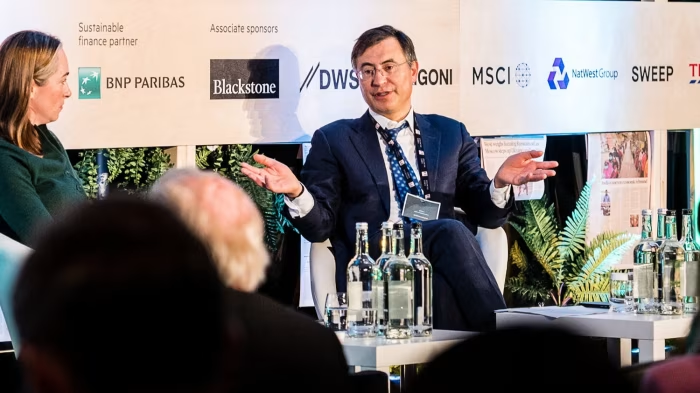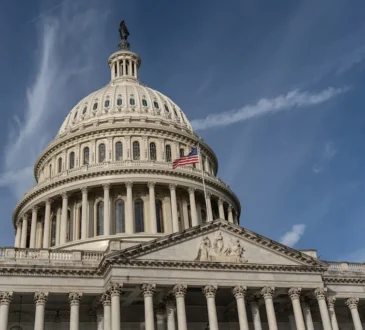
Welcome to FT Asset Management, our weekly newsletter on the movers and shakers behind a multitrillion-dollar global industry. This article is an on-site version of the newsletter. Subscribers can sign up here to get it delivered every Monday. Explore all of our newsletters here.
Does the format, content and tone work for you? Let me know: emma.dunkley@ft.com
One scoop to start: Asset manager Aberdeen Group will warn the UK government of “significant challenges” facing individuals attempting to gain access to private assets, flagging concerns over the transparency of valuations and big variations in performance.
In today’s newsletter:
-
Billionaire Chris Hohn’s foundation stops giving to US charities
-
Goldman Sachs on the rush to private assets
-
Investors pour record amounts into global equity funds ex-US
Chris Hohn’s foundation halts donations to US charities
Even billionaires are finding the arcane realm of US policy problematic.
Hedge fund manager Sir Chris Hohn’s charitable foundation has stopped giving grants to US non-profit, non-governmental organisations, saying it no longer understands the “US policy environment” for making donations.
The Children’s Investment Fund Foundation said it was pausing donations until authorities clarified the “applicable laws and rules” related to the foreign funding of US NGOs, write Josh Spero, Costas Mourselas, Joe Miller and Toby Nangle.
The CIFF, which has assets of $6.1bn, has focused its donations on child health and development, climate change as well as sexual and reproductive health and rights.
In a statement posted on its website this week, the CIFF added that, until the rules were clarified, it would “redirect its funding to, and restructure its contracts to be with, non-US NGOs”.
Last month, Americans for Public Trust, a conservative non-profit organisation, accused the CIFF of putting “more than half a billion dollars into US activist organisations as part of a broader effort to push radical climate and DEI policy on US soil”.
The move by the CIFF comes as Donald Trump’s administration has launched an assault on the non-governmental sector, which the US president claimed last year was full of “thugs and sleazebags”.
The president has signed a series of executive orders targeting non-profits’ tax-exempt status and various causes funded by left-leaning groups. He has accused donors such as George Soros and Reid Hoffman of funding “domestic terrorism”.
The attacks came as many smaller charities were already dealing with a funding shortfall, having had their federal funding cut for causes such as diversity and inclusion, climate change and foreign aid.
Hohn is one of the world’s best-known hedge fund managers, with an estimated net worth of $11.1bn.
Goldman Sachs on the rush to private assets
The rush of retail money into private assets is capturing the attention of some industry veterans.
Marc Nachmann, the head of Goldman Sachs’ money management business, has warned that the deluge of cash is pressuring fund managers to deploy capital quickly and risk buying bad assets, write Brooke Masters, Eric Platt, Joshua Franklin and Alexandra Heal.
So-called evergreen funds, which offer long-term investments in private companies, are gaining traction among individuals and wealth managers, as opposed to institutional investors such as pensions funds, because they allow retail investors to deposit and withdraw cash at regular intervals.
Speaking at the FT’s Future of Asset Management conference in the US last week, Nachmann said the need for these funds to deliver returns immediately after funds are deposited risked creating poor incentives for asset managers.
“We’re hearing this about investment committees over-ruling deal teams, who turn the deal down, investment committees over-ruling them to actually do a deal because of the deployment needs,” Nachmann said.
The so-called democratisation of private assets is a new growth area for asset management but also one that industry leaders caution could bring reputational risk if not executed well.
“Collectively we have to get the communication right and the way we deploy things and actually the experience right,” Nachmann said. “We owe it to the end customer to get this right. But we also owe it to all of us to not create any accidents because if there is going to be an accident here, it’ll impact the whole industry.”
Joshua Easterly, co-chief investment officer of private credit group Sixth Street, said at the same event, that as billions of dollars started to flow into the sector from individuals, the risk of disappointment for investors increased.
“Where’s the supply [of investment opportunities] coming from? If demand exceeds supply, what is going to be the ultimate experience?” he said.
Chart of the week

Global equity investors are diversifying their portfolios away from the US despite a dramatic rally carrying Wall Street stocks to a string of record highs, fund flows data shows.
Investors are pouring record amounts into global equity funds that specifically exclude the US, according to analysis of data from fund tracker EPFR by Société Générale — more than is going into equivalent global funds that include US stocks, writes Emily Herbert.
Wall Street has roared back from its lows in April and shows no sign of losing its appeal to global investors. But the fund flows data, as a snapshot of broader market behaviour, shows that investors are increasingly seeking to balance their US exposure with investments elsewhere.
“That rebalancing is taking place,” said Jim Caron, chief investment officer for Morgan Stanley Investment Management’s Portfolio Solutions Group. “Going forward, you are going to have more globally diverse portfolios.”
The most recent available data shows investors putting more than $175bn into “ex-US” global equity mutual funds and exchange traded funds over the past month, compared with just over $100bn into global funds that include US stocks.
Stock markets outside the US — particularly in Europe and emerging markets — powered ahead of Wall Street early this year, as fears grew about the potential fallout from US President Donald Trump’s erratic policymaking.
This marked a big shift from previous years, when many investors saw US megacap tech companies as the only game in town.
Five unmissable stories this week
Peter Hargreaves, the billionaire co-founder of Hargreaves Lansdown, is stepping down as a board director of the UK’s largest “DIY” investment site, months after its £5.4bn acquisition by private equity firms.
State Street’s flagship S&P 500 exchange traded fund is on track to post the largest annual outflows of any such fund in history.
St James’s Place, the UK’s largest wealth manager, is rolling out cheaper investments after a shake-up of its charging structure over the summer, following pressure from the financial regulator.
British pensions provider TPT wants to launch a defined benefit “superfund” that will hold schemes rather than selling to an insurance company, in an attempt to revive a model of pensions consolidation.
UK investors will be allowed to hold cryptocurrency exchange traded products within tax-incentivised individual savings accounts (Isas) and pension schemes, although some investment sites have issued warnings.
And finally

Modern Art Oxford is hosting Prophetic Dreaming, a retrospective by pioneering digital artist Suzanne Treister. The show includes work spanning more than 40 years, covering Treister’s investigations into new technologies, networks of power, and alternative belief systems.
Until April 12 2026
Thanks for reading. If you have friends or colleagues who might enjoy this newsletter, please forward it to them. Sign up here
We would love to hear your feedback and comments about this newsletter. Email me at emma.dunkley@ft.com




